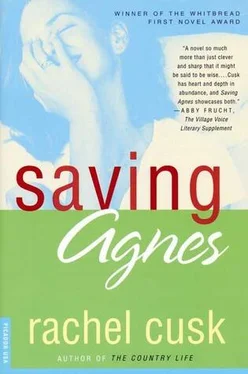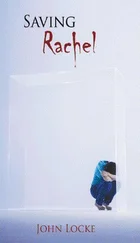‘I didn’t feel a thing,’ she said, aiming for cheerfulness.
At that he turned away from her completely, shrugging her arm from his side. Agnes realised that politeness was perhaps not the order of the day.
‘I’m sorry,’ she said.
‘It’s okay,’ he replied, misunderstanding her. ‘A lot of people aren’t that good at sex. Don’t worry about it.’
Had he circumcised her like an Asian bride, he could not have rendered her more effectively his. That night she lay awake confused and cried for fear of him; although later she was to cry at the thought of how easily they could never have met; and later still, at the fact that they ever did.
Though it was growing late, he suggested they go and look at the maze.
‘Get lost?’ she said, wishing she’d had the courage to abandon the interrogative inflection. ‘At this time of night? We’ll never find our way out in time.’
He had found her drinking tea in the small garden cafeteria, where she had gone giving up all hope of him. The manner of his discovery had annoyed her, for she had spent at least half an hour in the garden striking winsome poses of contemplation against various horticultural backdrops in the hope that he would happen upon her and be struck afresh by love. Eventually, however, she had grown cold and miserable and had stomped off in search of more reliable sustenance. His neglect stabbed at her heart, but shame at her presence in the tawdry tea-room left her no choice but to forgive him. Perhaps all was not yet lost. She could, after all, entrap him in the maze. She got up from the grubby table, her brown tray abandoned like a past life.
In the maze, Agnes suspected cheating, for it was surely not a superior sense of intuition which had sent him darting away from her down one alley and then another until she had lost him. Perhaps he had studied a map of it before they came or — worse still! — had spent those hours in which she had vainly searched for him in here, working out the best route. She had known men to do such things in the spirit of competition. They liked to trick and confuse her, setting up traps and then bursting in to save her with a victorious Ha! She chose an avenue at random and tried to memorise various leaves and twigs as she went, lest she should pass that way again.
A large bee cruised lazily around her head and then dived suddenly close to her face. She sprang back wildly as it boomed past her ear. Unobserved in the quiet green tunnel, Agnes twitched and laughed nervously. The sky overhead was leaking a dusky blue light and she wondered what would happen when it grew dark. Would they send in an efficient patrol to round up stragglers, or would they perhaps shout directions over a loudspeaker, the whole thing becoming suddenly like a sea or mountain rescue as their charges emerged forlornly, shaken and grateful? The sound of a child laughing caused her to jump. She looked around but it had evidently come from one of the adjacent corridors, for her own was empty. She had not realised how close they all were. Far from being comforted by the sound she felt menaced by it, like a blind person. The tall hedges chirped quietly around her. She wondered how her life had arrived at this moment: a path, a darkening sky, a child laughing, herself alone.
Some time later she gave up all hope of trying to maintain a sense of direction. She had heard that a monkey, given a typewriter, would in time produce the works of Shakespeare, and with new confidence in the genius of randomness she began turning and weaving aimlessly.
He would, by now, doubtlessly have found the centre and would at this very moment be lounging in it, triumphantly smoking a cigarette to mark his arrival. He would perhaps leave the glowing butt for her as testimony to his superiority, before sauntering out into the park where the warm streetlamps and night-time traffic on the road nearby invited him back into the city; she left trapped in the riddle of his rejection, the past he was putting behind him.
She turned into a particularly promising avenue and found it to terminate in a dead end. She wondered if she would always have to work so hard to find the point of things. She wanted to be sought rather than to seek. She wanted to be the point herself. In her mind they lined up, the people who had known her: a series of haphazard collisions, a motorway pile-up of twisted steel, their ruined fenders caught in a kiss, their bodies locked in a massive, involuntary, destructive embrace. She wondered if she had caused this noisy mess of tangled limbs and broken hearts; had gone the wrong way, steering crazy joyless arcs in the darkness, shooting the lights in the hope of encounter. John had once told her that if she gave people the freedom to leave, they would in all probability choose to stay. Agnes, in a state of emergency, could not contemplate the perversities of a free market.
She heard the sound of footsteps approaching down one of the dim tunnels. She looked up and made out the shape of a man. For a moment her heart leapt in a joyful arabesque at the thought that her lover had come to find her. As he grew closer, however, she saw that it wasn’t him. She tried to tug the smile from her face, but he saw it and looked at her curiously, perhaps wondering if he knew her.
‘That one doesn’t go anywhere,’ he said, indicating the path from which he had just come. He dug his hands in his pockets and trod heavily past her.
Agnes sat on a bench in the centre of the maze. It was nearly dark now. Only a few minutes earlier, a bell had rung into the silence to signal the imminent closure of the area. Really it was a sordid affair. She gazed round the grim enclosure with its overflowing bins and cigarette-strewn floor, its single tree graven with the names of lovers. She wondered who they were, these people who saw fit to advertise their union in a place they would not see again; or perhaps would see later, alone, knowing now what they had so desperately wanted to know then, blushing perhaps at their faulty arithmetic which, in calculating that one and one made one, implied that now they were half the people they once had been. Perhaps they would add dates, like tombstones.
Two people came into the small clearing. Agnes watched them as they congratulated themselves. They paced its small distance like a prison cell and waited for something to happen. When it didn’t they looked at her suspiciously and then ambled back into the maze. She smiled to herself knowingly. There was nothing here. It was a hoax, an illusion of significance. She had lingered here merely to explore its pointlessness.
‘What was the point?’ she had said when he told her. ‘What did you want from me?’ And then, angry at his silence: ‘Why did you bother?’
The fact that there was someone else, that there had always been someone else, would cease to hurt in time. She had found him here, leaning against the tree with prophecy in his bearing, and in her foolishness had thought this augured well. He had surprised her, in any case. She wondered that he had told her at all. She would suffer for that later. For now, scavenging for clues in the empty room of his motive, she was content to be a fool. The bell rang out again as a low moon crested the sky like a lone, slow-motion surfer skating a vast blue wave. She couldn’t stay here. Here was the moment that could not be hung on to. That things couldn’t just stop was one of her main complaints against the world. She would take the train home, he having taken the car.
‘TRY four,’ said Nina, popping open a can of beer.
A small volcano of foam erupted through the aperture and she swiftly applied her mouth to it to catch the spillage. It was Sunday, and they were gathered indifferently together in the sitting-room like the wreckage of a rough weekend.
Читать дальше












